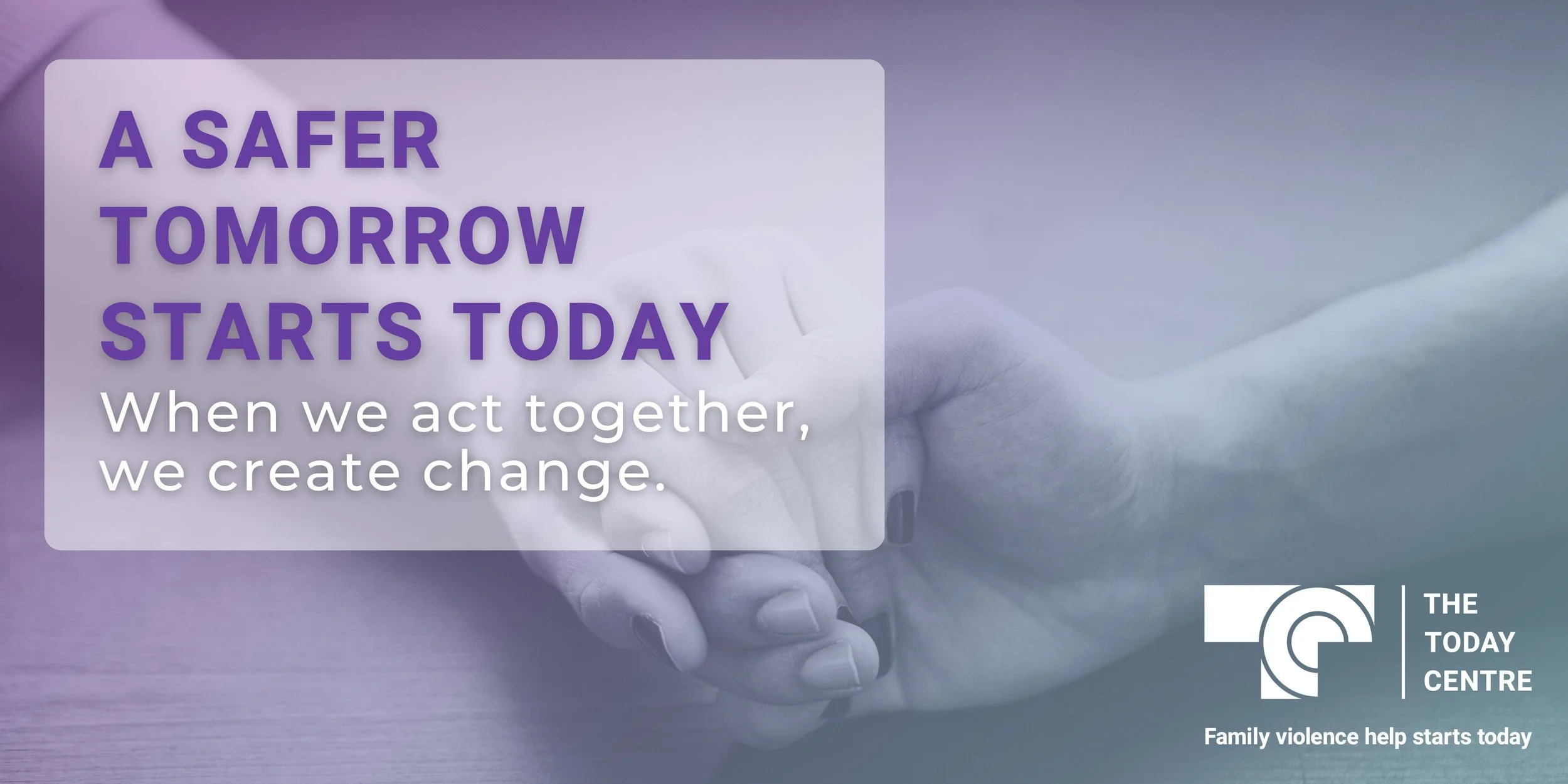A Safer Tomorrow Starts Today: How Our Communities Can Be Part of the Solution
Family violence is not confined to private spaces—it touches every part of our shared community.
It affects how children learn, how employees work, how families connect in places of faith and culture, and how we show up for one another in times of need.
Across Canada, the economic cost of spousal violence alone is estimated at $7.4 billion (An Estimation of the Economic Impact of Spousal Violence in Canada, 2009) each year, with most of those costs carried by survivors and their families. Behind these numbers are lives disrupted by fear and loss, but also stories of resilience, courage, and the possibility of change.
At The Today Centre, we believe prevention and intervention are shared responsibilities that begin with awareness, education, and compassion.
This year’s Family Violence Prevention Month campaign, A Safer Tomorrow Starts Today, explored four key spaces where prevention takes root: faith and cultural communities, schools, workplaces, and our shared community. Each plays a unique role in shaping safety, awareness, and accountability.
Faith and Cultural Communities
Trusted Spaces for Safety and Healing
Faith and cultural communities can be the first-place people turn for comfort, belonging, and guidance.
Family violence may appear as emotional, spiritual, financial, or psychological abuse. In some communities, cultural norms, language barriers, or fear of shame make disclosure difficult.
Breaking that silence requires courage, compassion, and leadership.
How Communities Can Respond:
Create opportunities for open, non-judgmental conversations about safety and well-being.
Challenge myths that label violence as a “private family matter.”
Protect privacy and build trust for those seeking help.
Partner with organizations like The Today Centre for community-led education and training.
Resource Spotlight:
Schools and Learning Spaces
Building Awareness and Safety from a Young Age
Family violence doesn’t just stay at home; it follows children into classrooms, affecting how they learn, focus, and connect.
Students exposed to violence may miss school, struggle with concentration, or experience anxiety, depression, or trauma-related symptoms.
Schools can be one of the first places where warning signs are noticed. Teachers, counselors, and peers all have a role in fostering environments that help children feel safe, supported, and seen.
What Educators and Caregivers Can Do:
Learn to identify behavioural and emotional signs of family violence.
Encourage age-appropriate conversations about respect, empathy, and healthy relationships.
Establish confidential pathways for students to access help.
Collaborate with The Today Centre to host educational workshops for staff or parents.
Resource Spotlight:
The Today Centre’s ‘Healthy Relationships’ presentation for grades 8-12 focused on recognizing red flags and knowing where to turn for help.
Workplace Communities
Creating Safer, More Supportive Environments
Family violence doesn’t remain at home—it can impact attendance, focus, and safety at work.
For employers, understanding these impacts is imperative as an Occupational Health and Safety (OHS) issue. Workplaces that recognize this are better equipped to protect both employees and productivity.
What Workplaces Can Do:
Include family violence awareness in OHS and employee wellness training.
Develop clear, confidential policies for disclosure and safety planning.
Offer training such as Family Violence Impacts at Work: What Workplace Leaders Need to Know and What Every Employee Needs to Know.
Resource Spotlight:
The Today Centre’s Education Program — Specialized training for workplace professionals, leaders, and employees.
Government of Alberta OHS Resources — Guidance on addressing domestic and family violence in workplace safety programs.
Our Shared Community
Collective Action for Prevention and Change
Family violence is not a private issue; it is a community concern that affects our social fabric, public systems, and economy.
When we work together to challenge stigma, invest in prevention, and prioritize safety, the benefits reach far beyond individual households.
Why Collective Action Matters:
Prevention saves lives and reduces long-term costs in healthcare and social services.
Awareness empowers bystanders, neighbours, and service providers to respond safely.
Collaboration strengthens civic trust and community wellbeing.
How You Can Get Involved:
Share reliable information using the hashtag #ASaferTomorrowStartsToday.
Invite The Today Centre to speak at your workplace or community event.
Support the Shaping Tomorrow Fund, which sustains the infrastructure that keeps vital services running
Stories of Resilience and Hope
“You helped me understand the difference between abuse—and how to get help in an instant of danger.”
“The support you gave anchored me when I had no one.”
“I’m looking forward to living in peace—to the thought of a happy life.”
Behind every statistic are individuals rebuilding their lives. Programs like Lives on the Line and Safe at Last provide practical, life-changing supports—from emergency cell phones to reducing barriers to safety—helping survivors regain independence and confidence.
Sustaining the Work: The Shaping Tomorrow Fund
Nonprofits across Alberta face mounting financial challenges as demand for services rise. The Shaping Tomorrow Fund was created to ensure The Today Centre can continue meeting those needs. This unrestricted fund supports essential operations—keeping staff trained, programs responsive, and doors open for those seeking safety.
Your donation strengthens the foundation that makes prevention, education, and crisis response to client needs possible.


